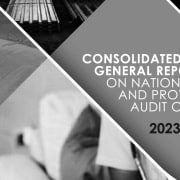|
Getting your Trinity Audio player ready...
|
Image: MM Sakonda & Associates
On 13 May 2021 the MEC of health in the North West, Madoda Sambatha, first officially announced the opening of the Jouberton Healthcare Centre in Klerksdorp. This development was to be a major relief for a province which for years has been dogged by public healthcare controversies. A media release that marked the occasion expressed Sambatha’s delight at the milestone, but went on to acknowledge challenges experienced by his department in the lead-up to the opening of the facility.
The statement referred to “bottlenecks” that had to be “unlocked” for the clinic to reach the state of readiness. But Sambatha added: “I promised the people of Jouberton a functional new community health centre and I am happy that the promise has materialised.”
The media release also put the value of the project at R160-million, a figure that would escalate by over R60-million in true cost. More on that later.
The good news for the people of Jouberton is that the facility became operational just weeks later, welcoming its first patient to its maternity unit in June of that year. The bad news, however, is that behind the joy and relief associated with the service delivery milestone was an unwelcome symbol of costly bad governance: several department officials were being investigated as the clinic was being opened, for their part in a material irregularity (MI) recently recorded by Auditor-General Tsakani Maluleke.
Material irregularities under AG spotlight
The procurement process relating to the clinic is one of 29 MI cases being monitored by Maluleke as part of her office’s expanded mandate. The North West province has the highest number of such irregularities, 14 higher than the second biggest transgressor, the Eastern Cape (15), which is followed by Gauteng, Mpumalanga and the Northern Cape with nine cases each. The Free State and KwaZulu-Natal cases are at eight each, while Limpopo has three and the Western Cape one. The total estimated cost of MIs to the public purse over the course of the past three years is a staggering R12-billion.
MIs are defined by the Public Audit Act as: “Any non-compliance with, or contravention of, legislation, fraud, theft or a breach of a fiduciary duty identified during an audit performed under the Public Audit Act that resulted in or is likely to result in a material financial loss the misuse or loss of a material public resource or substantial harm to a public sector institution or the general public.”
In the case of Jouberton clinic, the North West health department failed to follow public procurement rules both in the pricing element of the project, and in the payment to the contractor appointed to construct the facility. A result of the latter indiscretion was that interest accumulated over the period between the completion of the phased-in project and its opening ran into some millions.
According to the AG, the department is in negotiations with the contractor over the overpayment incurred for services due to inflated costs of construction. “In July 2022, the accounting officer notified the contractor of the recovery of the overpayment from the contractor’s ‘preliminary and general’ balance due by the department.”
Furthermore, the department is in the process of taking disciplinary steps against the implicated officials, with hearings having commenced in June 2022 and currently ongoing.
Expanded powers yield results
Maluleke notes in her latest audit report of provincial and national departments that her office’s ability to track and act on MIs as per the changes to its powers in 2019, has resulted in an increased number of state entities being more vigilant and responsive in that area of the audit process. She records 179 in current MIs picked up in both provincial and national departments over the course of the past three years.
“In 2021/22, we expanded our work significantly by implementing the process at 202 auditees in national and provincial government – from 95 in 2020-21. The selected auditees included all state-owned enterprises, departments and public entities that are key contributors to government priorities. They were responsible for 91% of the estimated expenditure budget of R2.58-trillion in 2021-22. We plan a further increase in 2022-23 to 430 auditees,” Maluleke notes in her report.
The process from her office’s perspective involves noting MIs during the audit process, notifying the department or entity affected, and then following up on action taken by that entity to remedy the irregularity. “Where accounting officers and authorities respond to our notifications with commitment and workable plans to implement appropriate action to resolve the MI, the intended impact of the Public Audit Act amendments is achieved.”
“The objective is to enable corrective action to resolve the MI and prevent similar ones in future. The impact achieved by the MI process is evident from the actions taken and changes in behaviour by the accounting officers and authorities to resolve the MIs that resulted in, or is likely to result in, financial loss.”
Not all accounting officers are coming to the party, however.
The age-old challenge of some government entities failing to submit financial documents on time persists, despite the efforts of the AG’s office. Three of these cases are also in the North West.
“We … used our expanded mandate to address the non-submission of financial statements by three public entities in the North West for the past three years, as the lack of accountability is causing significant harm to these public sector institutions.”
Jouberton clinic, Maluleke says, is the first case of an MI issued on a “material public resource.”
In cases where public entities do not address the MIs highlighted to them, the AG either includes recommendations in the relevant audit report or invokes her additional powers of referral and remedial action. “The departments and public entities where we took further are also those where we typically experience a slow response to our findings and to improving the control environment.”
Real cost and accountability in MI monitoring
Responding to a question in Parliament in September 2021, then newly-appointed health minister of Health Joe Phaahla put the total cost of the Jouberton clinic project at over R222-million, a significant leap from the original contract value of just over R149-million in 2016, when the project first got underway.
While this may not be solely attributable to irregularities as identified by the AG, the efforts by her office to monitor spending and accountability for projects such as this one remain key.
In this regard, she makes a plea to other oversight bodies to play their part:
“We urge all role players in the national and provincial ecosystem to support, monitor and oversee the resolution of MIs. When the auditor-general’s powers of referral and remedial action (and the issuing of certificates of debt in future) are invoked, it not only reflects poorly on the accounting officer or authority, but also means that the whole accountability value chain has failed, up to executive and oversight level.”
She further recommends that:
- portfolio committees in Parliament and provincial legislatures request quarterly reports from accounting officers and authorities on the status of their material irregularities and to account for any unreasonable delays in resolving the MIs
- portfolio committees in Parliament responsible for public bodies where there are delays in investigations as detailed earlier also request regular reports on the status of these investigations and must address any unreasonable delays in the investigations.
“Our expanded mandate did not change the role and responsibilities of accounting officers and authorities or the oversight and monitoring roles of executive authorities and oversight structures to prevent and deal with irregularities, such as non-compliance, fraud, theft and breaches of fiduciary duty. Through the MI process, we strengthen them in this role.”








